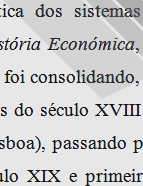

................................
As already noted, the author "seeks to diagnose the backwardness of the Portuguese economy, to support business freedom, the advantages of manufacturing and the introduction of steam power, and generally outline the paths for the country's industrialisation" (Carlos Bastien, A divisão..., 2000, p. 14). Some of his key economic works are Variedades sobre Objectos Relativos às Artes, Comércio e Manufacturas [Varieties on Objects Relating to the Arts, Commerce and Manufacture] (1814 and 1817); Memória sobre os Meios de Melhorar a Indústria Portuguesa [Memoir on How to Improve Portuguese Industry](1820); and Considerações Políticas e Económicas sobre os Descobrimentos [Political and Economic Considerations on the Discoveries] (1830). A more comprehensive analysis of his biography and work can be found in the introductory studies to Volume I of his Complete Works (pp. 15-136) by António Almodovar (see also the article in the Dicionário Histórico de Economistas Portugueses [Historical Dictionary of Portuguese Economists] 2001, pp. 221-225) and Armando Castro. The two and a half decades following the Liberal Revolution of 1820 were not conducive to the development of historical research, leaving little to highlight. However, the immediate subsequent period saw significant developments. First and foremost, the monumental historiographical work of Alexandre Herculano (1810-1877) triggered an absolute revolution in the perspective and methodology of historical writing, imparting a scientific rigour that greatly benefited future generations. His major historiographical works, without forgetting his important literary production, include História de Portugal: 1.ª época, desde a origem da monarquia até D. Afonso III [History of Portugal: 1st period, from the origin of the monarchy to King Afonso III](1846-1853); História da Origem e Estabelecimento da Inquisição em Portugal [History of the Origin and Establishment of the Inquisition in Portugal](1854-1859); and Portugaliae Monumenta Histórica (1856-1873). Although economic issues were not Herculano's primary focus, his contribution is worthy of note. Firstly, he emphasised the need to shift from traditional history, which focused on eminent individuals, to a broader societal history: "let us seek the history of society and leave that of individuals aside" (apud Oliveira Marques, Antologia da historiografia...Anthology of historiography], vol. 1974, p. 30).
